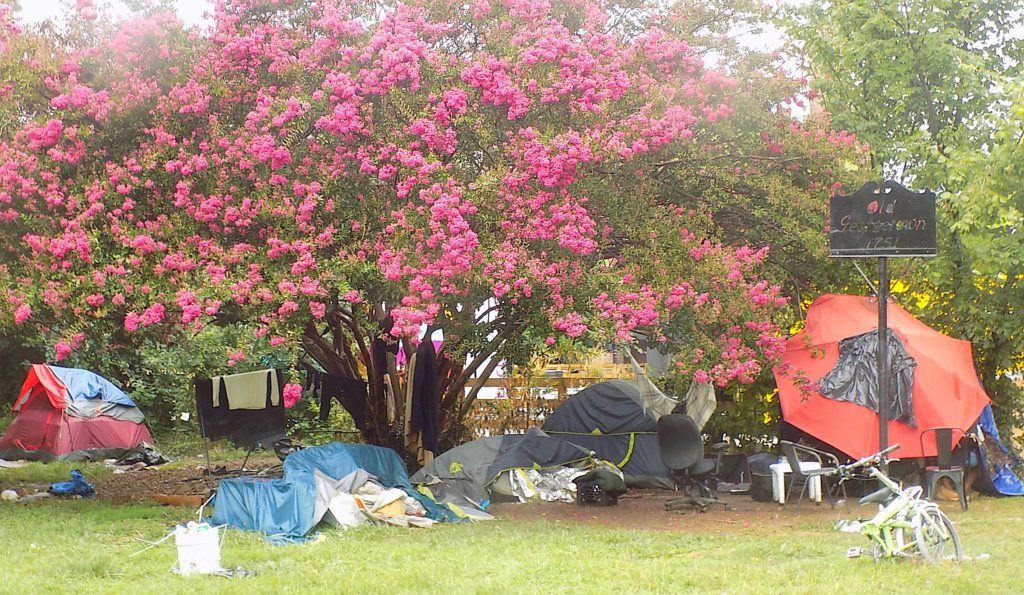We Spoke with D.C.’s Homeless Residents
By • August 18, 2021 0 1873

Most of us may not have noticed them — tent encampments popping up around the city.
Family-size tents with furniture suggestive of more permanent stays. The unhoused people in the parks and in the fringes appear to be preparing for the worst but hoping for the best. They’re concerned about the upcoming winter, but know their stay in the area may be longer than they had expected.
We visited a cluster of tents sitting above the on-ramps to the Rock Creek Parkway and Whitehurst Freeway. When we arrived, there was a middle-aged man sitting at a table, using a generator to power a fan to keep him cool and charge a phone that was sitting on a picnic table in front of him.
The man was friendly, eager to share his story about being from Sweden. His accent was thick, and he told us he had been homeless for five months, which would put him living at the enclave since around March of this year when the pandemic took hold. As he concentrated on rolling a joint, the man explained he was educated and had a background in finance and stocks. He spoke fingering a gold cross necklace, telling us he had been an army veteran, serving 10 years and ending his service due to a disability. When he got up to throw away a piece of trash, he was slightly stooped and had a visible limp.
Soon after we began speaking, another middle-aged blonde woman in aviator sunglasses wandered over. She sat at the opposite head of the picnic table, quietly listening to us speak with the Swedish Army vet nearer to us. The two shared their vaccination status (both fully protected) and seemed to understand the importance of the shot, especially given their living arrangements.
Before we got to speak further to the blonde woman, a boisterous Jamaican woman wandered over. She was clad in purple slippers, a King’s Hawaiian Rolls bright orange apron and a pink headband with a bow on top. A lot of what the woman said was incoherent, but we were able to gather that she did hair and nails at one point in her life. She ran back to her tent to show us a square piece of wood she had written all her specialties on, including manicures and pedicures, “Janet Jackson braids,” cornrows and lots more. A creative soul, she also showed us bracelets she had made and shared with us her knitting abilities.
However, due to whatever ailed the woman — whether it was a mental illness or drug addiction — she got angry quite easily. She became particularly upset when she recalled a story of a woman high on PCP who threw away her baby.
While the Jamaican woman spoke, two other younger men came up to see what was going on. The taller of the two, a Black man with a salt-and-pepper goatee, told me it was the first time he found himself homeless in 20 years. His roommate and he got kicked out of their housing accommodations after his roommate failed to pay rent. According to the man, his roommate had been a cocaine and meth addict as well as an alcoholic and used his rent money to pay for his habits.
The man had recently gotten laid off from his construction job due to the ongoing pandemic, so now here he was. When asked if he was vaccinated, he adamantly said “no.” The Jamaican woman seemed to overhear this question and loudly proclaimed that “God will take me when it’s my time!” She, too, was unvaccinated.
The second of the younger men spoke to me about how his mother was a doctor so he “had to get vaccinated.” It was unclear whether the man lived in one of the tents, as he shared with us that he had supplied around half the tents in the area. He was getting ready to go to work, in red Nikes and Apple Air Pods in his ears. He stood close, sipping an open bottle of Jose Cuervo tequila before admitting he was heading into work. He shared that he worked in the restaurant business, having experience in cooking.
It was unclear where exactly he worked, but he did share that he “works for rich people” and he was sipping the tequila because “the job [is] stressful.” He admitted he never swore at work as much as he had the previous week. Despite all this, he was genuinely grateful he did have a job.
The unhoused folks we spoke to are part of an ongoing homelessness problem in the D.C. area. According to the D.C. Department of Human Services, the number of chronically homeless people in the city rose from 1,337 in 2020 to 1,618 in 2021, an increase of about 21 percent. The number of unsheltered individuals not considered chronically homeless also rose, from 653 to 681 people. Particularly concerning is the number of homeless between the ages of 18 and 24 — that number rose about 34 percent in D.C. since 2020.
We set out to look at this pandemic problem, focusing on solutions and ways to help people like the individuals we met along Virginia Avenue near the Kennedy Center.

